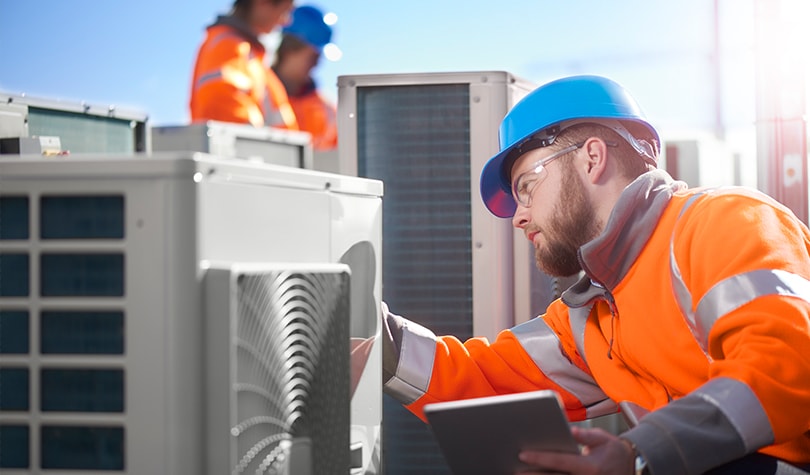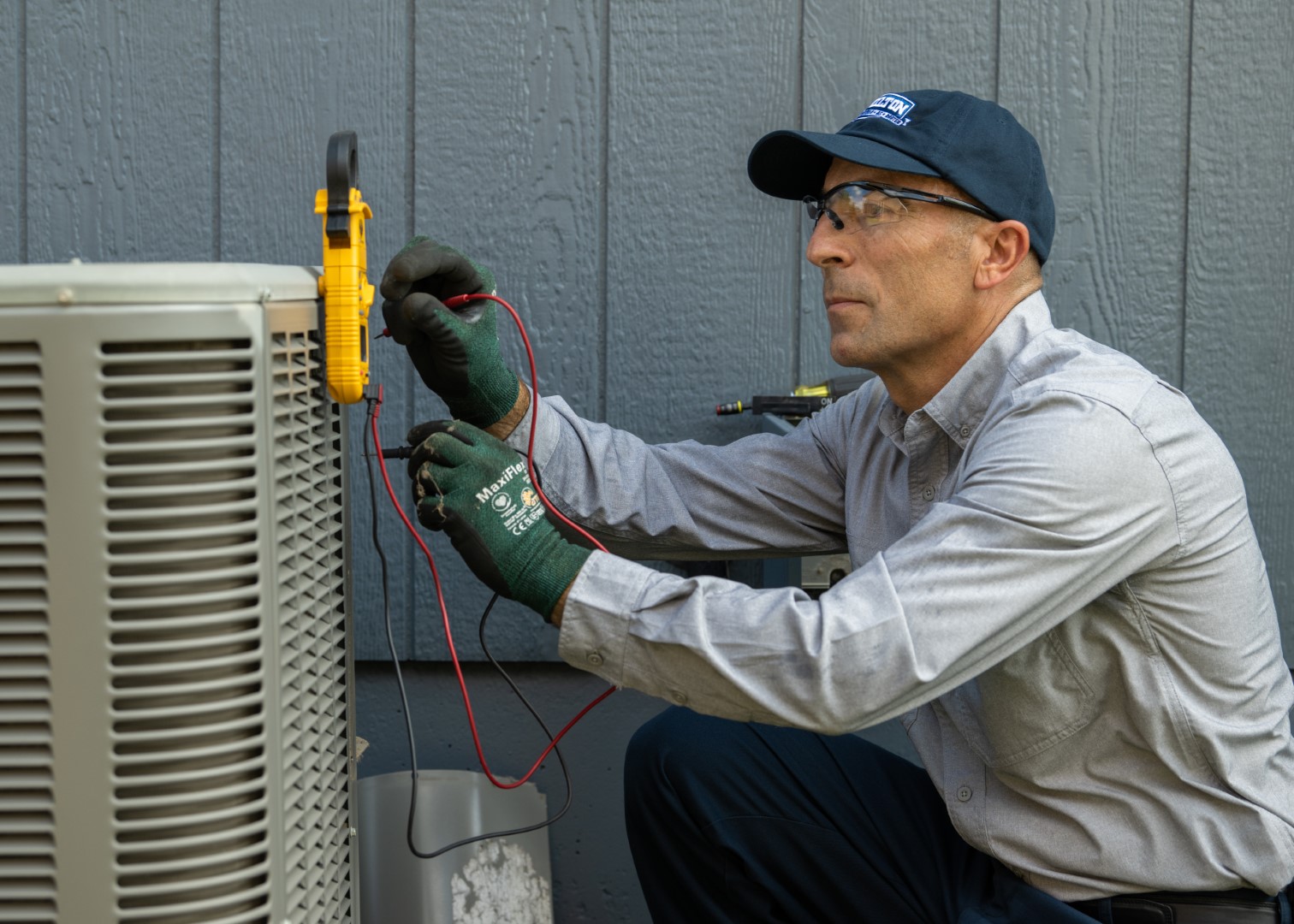Why working with an AC repairman can extend your unit’s life
The Significance of HVAC Expertise: Discovering Reasons For Air Conditioner Issues for Homeowners
House owners typically overlook the relevance of recognizing their heating and cooling systems. Identifying typical signs of a/c troubles can result in timely treatments. Problems like insufficient cooling or uncommon sounds are not simply nuisances; they can show deeper worries. By discovering the origin of these issues, home owners can enhance system efficiency and prolong its life-span. What are one of the most widespread issues that can occur, and exactly how can they be properly dealt with?
Typical Indicators of Air Conditioner Troubles
Just how can homeowners determine problems with their cooling systems before they escalate? Recognizing typical indications of air conditioning troubles is necessary for prompt maintenance. One common sign is insufficient cooling; if the a/c system fails to lower the interior temperature, it might indicate underlying issues. Uncommon noises, such as grinding or hissing, can likewise show mechanical failings or loosened elements - air conditioner repair. In addition, homeowners ought to be skeptical of strange odors originating from the device, which may suggest mold and mildew development or electrical troubles. Regular cycling on and off, referred to as short cycling, can suggest thermostat problems or refrigerant leakages. Furthermore, a rise in power costs without a corresponding increase in usage may direct to inefficiency. By staying sharp to these warning indicators, homeowners can prevent a lot more considerable concerns and pricey repair work, guaranteeing their air conditioning systems operate efficiently throughout the warmer months

Understanding Refrigerant Issues
Refrigerant problems can substantially impact the performance of an a/c system. Property owners ought to know the signs of reduced cooling agent levels and the relevance of spotting refrigerant leakages. Addressing these troubles promptly can stop additional damage to the system and warranty optimal cooling down performance.
Low Cooling Agent Degrees
A typical concern that homeowners may experience with their a/c systems is reduced cooling agent degrees, which can substantially affect the system's performance and efficiency. Cooling agent is crucial for the cooling process, absorbing warmth from interior air and launching it outside. When levels drop, the a/c device struggles to cool down the room efficiently, causing increased energy intake and prospective system strain. Signs of low cooling agent consist of insufficient air conditioning, longer run times, and ice formation on the evaporator coils. Property owners might also see unusual noises as the compressor works harder to make up for the deficiency. It is necessary for house owners to comprehend the significance of keeping correct refrigerant degrees to assure peak a/c performance and longevity.
Refrigerant Leaks Discovery
Where might a home owner start when confronted with the possibility of refrigerant leaks in their HVAC system? The very first step involves checking the system's performance. Indicators such as minimized cooling performance, ice development on coils, or hissing sounds may indicate a refrigerant leakage. Homeowners should likewise look for visible indications of oil residue, often a dead giveaway of a leak. Making use of a refrigerant leakage detector can offer even more precise identification. If uncertainties persist, consulting a licensed a/c professional is essential, as they have the competence and tools to situate leakages efficiently. Trigger discovery and repair of cooling agent leakages not just enhance system effectiveness however additionally prevent potential environmental harm, making it a crucial facet of HVAC maintenance.
Electric Failures and Their Influence
Electrical failures can considerably affect cooling and heating systems, particularly with concerns like breaker malfunctions and damaged wiring. These problems not only interrupt the system's performance however can additionally bring about pricey repairs and safety risks. Recognizing the implications of such failings is essential for home owners to preserve an effective and risk-free cooling and heating atmosphere.
Breaker Issues
How can breaker problems influence the effectiveness of a HVAC system? Circuit breakers serve as vital security devices that take care of electrical flow to HVAC devices. If a circuit breaker journeys often, it interferes with power supply, causing irregular heating or cooling. This can create substantial stress on the system, leading to inefficient operation and potential damages to parts. Homeowners might notice boosted energy bills as a result of the cooling and heating system's struggle to maintain wanted temperatures. Furthermore, duplicated interruptions from stumbled breakers can reduce the life-span of the air conditioner unit, calling for costly repairs or replacements. Normal maintenance of breaker is vital, as it assures a steady power supply, inevitably boosting the general performance of the HVAC system.
Faulty Electrical Wiring Impact
Often overlooked, malfunctioning electrical wiring can have dire repercussions for a/c systems. Electrical wiring concerns might bring about short circuits, leading to constant failures and boosted repair prices. Additionally, incorrect electrical wiring can create ineffective power use, bring about check here higher utility bills and pressure on the system. In extreme situations, damaged electrical wiring can cause electrical fires, posing a substantial security danger to homeowners. Additionally, these electrical failures can damage a/c elements, leading to expensive replacements or considerable fixings. Home owners must prioritize regular examinations by certified specialists to identify and correct wiring problems prior to they intensify. Understanding the effects of damaged circuitry can help ensure the durability and security of a/c systems, eventually securing both the home and its residents.
Clogged Filters and Their Effects
While lots of property owners may neglect the importance of normal filter upkeep, clogged filters can result in substantial consequences for HVAC systems. When filters end up being obstructed with dirt, dirt, and particles, air flow is restricted. This reduction in air movement compels the system to function harder, bring about raised power usage and potentially higher utility expenses. Gradually, this stress can cause deterioration on parts, causing early system failure.
In addition, blocked filters can endanger indoor air top quality. Pollutants and irritants might circulate throughout the home, aggravating respiratory system issues and allergic reactions for residents. Inadequate air movement can cause the evaporator coil to freeze, leading to pricey repair work and inefficient air conditioning efficiency. Routinely changing or cleaning up filters is an easy yet essential upkeep task that can aid ensure the long life and performance of HVAC systems, inevitably profiting both the property owner's convenience and their finances.

Thermostat Malfunctions Described
What takes place when a thermostat malfunctions can greatly impact both comfort and energy efficiency in a home (HVAC contractor). A faulty thermostat might fall short to precisely check out the temperature, bring about overcooling or not enough air conditioning. This inconsistency can trigger discomfort for occupants and result in greater power bills, as the a/c system functions harder than necessary
Typical concerns include dead batteries, which can make digital thermostats inoperative, and loosened wiring that interrupts interaction between the thermostat and the a/c system. In addition, out-of-date or poorly adjusted thermostats may not react properly to temperature changes, additionally aggravating power ineffectiveness.
Property owners must be vigilant for signs of malfunction, such as irregular temperatures or unanticipated energy prices. Normal checks and understanding of the thermostat's performance can assist determine problems early, ensuring peak performance of the HVAC system. Attending to thermostat concerns immediately is important for keeping a comfortable living setting and managing power intake properly.
The Role of Routine Maintenance
Routine upkeep plays an essential function in making certain the durability and effectiveness of HVAC systems. Home owners that focus on regular checks can stop small concerns from escalating into costly repair work. Normal maintenance typically includes tasks such as cleaning filters, evaluating ductwork, and checking cooling agent levels. These activities help maintain suitable air movement and system performance, minimizing power usage.
In addition, a well-maintained a/c system runs a lot more successfully, supplying consistent comfort throughout the home. Regular tune-ups can also prolong the lifespan of the system, causing substantial cost savings with time. House owners are encouraged to arrange professional inspections at the very least yearly to recognize possible issues early.
In enhancement, lots of producers call for routine maintenance to maintain service warranties, making this practice not only beneficial yet typically required. Overall, understanding the relevance of regular upkeep encourages property owners to protect their a/c systems versus unanticipated failures and boost their investment in home convenience.
Frequently Asked Inquiries
How Can I Improve My A/c's Power Effectiveness?
Improving an a/c's power performance includes routine maintenance, cleansing or replacing filters, sealing ductwork, making certain proper insulation, making use of programmable thermostats, and scheduling expert inspections to identify and rectify potential issues affecting performance.
What Is the Life-span of a Common Air Conditioning Device?
A common a/c unit has a life expectancy of 15 to twenty years, relying on maintenance, use, and ecological aspects. Routine maintenance can substantially prolong its operational life and boost overall effectiveness.
When Should I Change My Cooling System?
A cooling system must usually be changed every 10 to 15 years. here Indications for replacement include frequent repair work, increasing power costs, and insufficient cooling, suggesting that an upgrade may be much more cost-efficient and effective.
Can I Troubleshoot Air Conditioner Problems Myself?
Yes, individuals can fix air conditioning problems themselves by checking filters, making sure power supply, and evaluating for noticeable problems (ac fix). Intricate troubles usually need professional help for accurate medical diagnosis and risk-free fixing, guaranteeing suitable system performance.
How Do I Select a Dependable Cooling And Heating Specialist?

To pick a dependable heating and cooling specialist, one must seek suggestions, examine on the internet testimonials, validate licenses and insurance policy, analyze experience, and demand thorough quotes to ensure high quality solution and reasonable pricing before deciding.
Final thought
To sum up, a strong understanding of HVAC systems allows property owners to efficiently diagnose and attend to usual cooling issues. Identifying indications such as insufficient air conditioning or increasing power prices permits timely interventions, which can considerably improve system efficiency and longevity. By remaining notified concerning prospective issues like refrigerant leakages, electrical failings, and clogged filters, home owners can take proactive actions to preserve their systems, inevitably making sure comfort and advertising a heating and air conditioning maintenance much healthier living setting. Normal upkeep stays crucial to this endeavor.